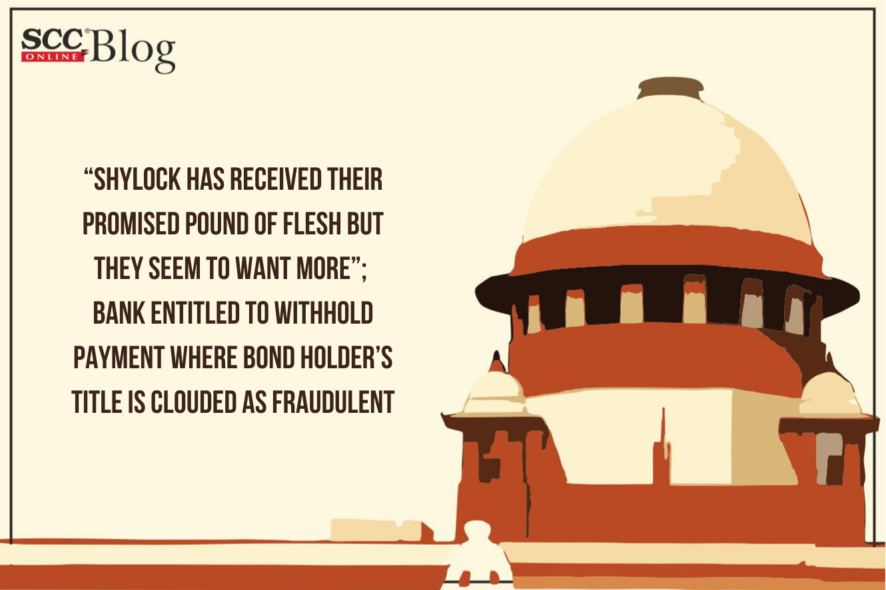Supreme Court: The Division Bench of Hrishikesh Roy* and R. Subhash Reddy, JJ., while deciding on an appeal challenging dismissal of suit by the Calcutta High Court restored the Trial Court’s judgement which was reversed by the High Court.
Factual Backdrop
The suit was filed by SIBCO Investment seeking interest on the alleged belated payment of principal sum and accrued interest to the plaintiff for the Bonds issued by Small Industries Development Bank of India (SIDBI). SIBCO had purchased 15 Bonds at 13.50% and 26 Bonds at 12.50% worth Rs3.69 crores aggregate as on 01-07-1998 from one Shankar Lal Saraf who had bought it from CRB Capital Markets Ltd. The name of the plaintiff was not included by SIDBI as CRB Capital was facing involuntary liquidation proceedings at the instance of the RBI in the Delhi High Court (Company Court).
On 17-12-2004, the Company Court held that the subject Bonds were beyond the purview of the liquidation proceedings. The defendant thus made payment of principal amount and interest calculated up to 31-10-2005 with 20% TDS deduction.
The plaintiff’s case was that the amount, both principal and interest were paid beyond the maturity period and, therefore, the defendant was liable to pay the interest for delayed payment. Whereas the defendant pleaded that the maturity amount was not paid on the date of maturity because of the embargo and restriction by the RBI and the pending proceedings.
Findings of the Trial Court
The Trial Court did not agree with the submission of the plaintiff that there was any deliberate attempt to delay the payment of the maturity amount by the defendant and subsequently dismissed the matter on two grounds: Firstly, the bonds could not be transferred as there was liquidation proceedings against CRB capital whereafter the RBI issued a directive to the petitioner directing not to part with any payment pertaining to the said Bonds without consent of the Official Liquidator and secondly, the plaintiff slept over the interest claim for almost 8 months after receiving the payment.
Impugned Order of the High Court
The High Court reversed the order of the Trial Court and allowed the plaintiff to raise further demands including demand for interest on delayed payment. Accordingly, the defendant was directed to pay simple interest at 6% per annum on interest from date of accrual and 8% simple interest per annum on principal amount from date of maturity.
Analysis and Findings
Noticing that the transfer in Shankar Lal Saraf’s favor was executed during suspect spell, the Bench opined that the defendant’s prima facie suspicion that the transfer during the suspect spell may be deemed fraudulent was not misplaced. Further, both the RBI and the Official Liquidator treated the transfer in Shankar Lal Saraf’s favour as fraudulent and it was only after the judgment of the Company Court that the cloud over the issue was cleared wherein the defendant’s claim that the transfer in Shankar Lal Saraf’s favour was ‘fraudulent preference’ was rejected. Hence, the Bench held the following:
- The RBI direction carried statutory force and that it was necessary for plaintiffs to implead RBI in the litigation for getting more clarity on the issue but the same was not done.
- There was bonafide shadow over the plaintiff’s title to the Bonds till the same was cleared by the Company Court. Therefore, withholding payment was justified till the conclusion of dispute by the Court.
- The plaintiff failed to establish that the defendant had derived any undue benefit by withholding the payment accrued on the Bonds since the amount was immediately transferred and was not used by the defendant for their business.
- The plaintiff was not serious on its claim for pendente lite interest as no argument was recorded in previous litigation regarding it.
- The plaintiff accepted the payment from the defendant as due settlement and failed to raise protest and demand for interest at the earliest possible stage which amounted to sub-silencio Hence, the claim was barred by the principle of waiver/acquiescence.
- Claim of interest on delayed payment was barred by the principle of constructive Res Judicata.
Conclusion
Finally, considering that as soon as the Company Court’s decision was communicated to the defendant, payment was promptly made to the plaintiff without hesitation, the Bench held that the defendant bank justified in withholding payment till conclusion of dispute in Company Court, even though the relief claimed was in respect of an ‘unconditional undertaking’, as there were reasonable legal concerns for the transaction during the suspect spell, for making such payments.
Consequently, the Bench concluded that the defendant was not entitled to payment till the Company Court’s order. Therefore, rejecting the plaintiff’s claim for interest the Bench compared it to the Shakespearean character Shylock and remarked,
“…the holder of the Bond has received their ‘pound of flesh’, but they seem to want more. Additional sum in our estimation is not merited as SIBCO has already received their just entitlement and burdening the defendant with any further amount towards interest would be akin to Shylockian extraction of blood from the defendant.”
In the light of the above, the defendant’s appeal against the impugned judgment was allowed and the Trial Court’s judgment was restored.
[SDBI v. SIBCO Investment, 2022 SCC OnLine SC 5, decided on 03-01-2022]
*Judgment by: Justice Hrishikesh Roy
Appearance by:
For the Appellant/Defendant: K V Viswanathan, Senior Counsel
For the Plaintiff/Respondent: Sabyasachi Chaudhury, Senior Counsel







